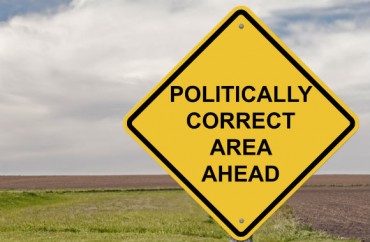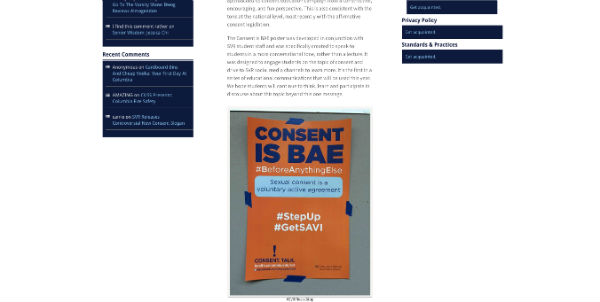
ANALYSIS
When a photo of a sexual-consent poster in development at Columbia University got posted on the Internet last week, ahead of its formal debut, it was swiftly mocked.
What’s less clear is whether any group of people took offense for the reasons the poster offended the leaker: cultural appropriation and not taking consent education seriously.
Scheduled to debut at freshmen orientation this week, the campaign by the Sexual Violence Response office is titled “Consent is BAE – #BeforeAllElse.”
For the uninitiated, “bae” is a quasi-ebonics term of endearment often used in lighthearted, often half-serious vernacular, as documented by Time last year. It can also mean “good or cool,” Time said.
As evidenced by the tape on the edges, the poster in the image had not been put up in public when the photo leaked. Otherwise it would have been framed.
An apparent insider sent the photo both to the Columbia student-run blog Bwog and the feminist news site Jezebel.
“In my opinion, and in the opinion of many other student activists I know on campus, this poster both trivializes consent and appropriates African American Vernacular English,” the tipster wrote, using an alternate phrase for ebonics.
The tipster did not provide any evidence that the poster actually offended any particular student population, but media reports have taken the tipster’s claims as gospel.
Not only Jezebel and Bwog but Campus Reform, a conservative student outlet, described “Consent is BAE” as offensive to “students,” plural, rather than the opinion of one anonymous tipster.
‘I think you’re being trolled’
Whoever leaked the photo, targeting both local and national news outlets, clearly wanted to spark outrage. The rest of the student body seems largely indifferent.
Most commenters on the Bwog post were incredulous that anyone took offense.
“Fucking no one finds this objectionable,” an anonymous online commenter wrote on the Bwog post. “Bwog, I think you’re being trolled,” another commenter wrote, comparing the poster to “adults asking if they’re ‘hip with the kids’” rather than “trivializing consent and appropriating.”
That sentiment – that Columbia was trying too hard to be cool – seemed widespread in other media reports. The New York Observer surmised that the school “most likely thought they were making the subject of consent approaching and youth-friendly” with the “bae” reference.
Twitter references to the #ConsentisBAE hashtag are also sparse and tend toward the “cool” view. (There’s an entire Twitter feed devoted to “Brands saying bae.”)
Lololol somehow the gifted minds at Columbia University thought that this slogan would go over well. #ConsentIsBae pic.twitter.com/o8sHIytEw4
— Dan Hermle (@DanHermleMTV) August 27, 2015
In response to the Bwog post, the Sexual Violence Response office told the blog that its consent campaigns have always aimed for a “constructive, encouraging, and fun perspective,” rather than a “lecture.” It said the “bae” campaign was developed “in conjunction” with student staff, and it provided another poster scheduled to go up.
‘Someone putting effort into being offended’
College Fix inquiries to the Black Students’ Organization and African Law Students Association at Columbia, regarding the alleged appropriation of the poster, went unanswered. The school does not appear to have a student-run sexual health group.
In man-on-the-street interviews with The Fix, most Columbia students declined to comment, but The Fix did track down one who found the nascent campaign offensive.
“It really doesn’t matter whether or not the thought was to appropriate black culture or not – it just does,” the student, who asked to remain anonymous, told The Fix. Using “bae” on a consent poster indeed “trivializes rape and other assaults many of the orientation participants may have already gone through.”
Another student who requested anonymity told The Fix via Facebook the “use of a pun/joke like that does trivialize the situation,” but seeing cultural appropriation in the campaign “seems to me like someone putting effort into being offended,” which he called “the norm” at the school.
It’s not the first time Columbia’s consent campaigns have drawn criticism for missing the mark.
Its “sexual respect” program was criticized by student activists this winter for letting students satisfy the new requirement by attending “an hourlong workshop of their choosing” or even “watch and discuss” videos on consent, Inside Higher Ed reported.
But the outrage never reached the level experienced by a male-led sexual-respect effort at DePaul University last year, whose “Consent the D” T-shirts were accused of being “triggering” to victims of sexual violence, as The Fix noted.
Like The College Fix on Facebook / Follow us on Twitter
IMAGE: Shutterstock, Bwog screenshot






Please join the conversation about our stories on Facebook, Twitter, Instagram, Reddit, MeWe, Rumble, Gab, Minds and Gettr.